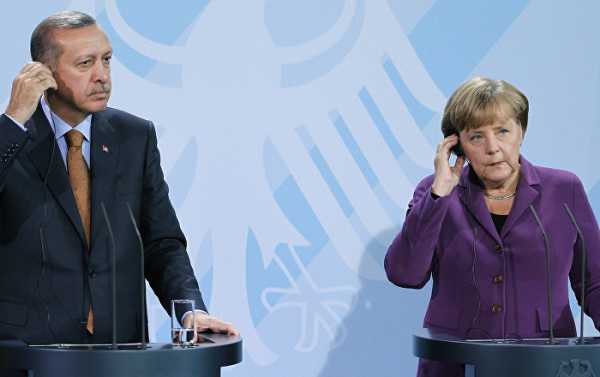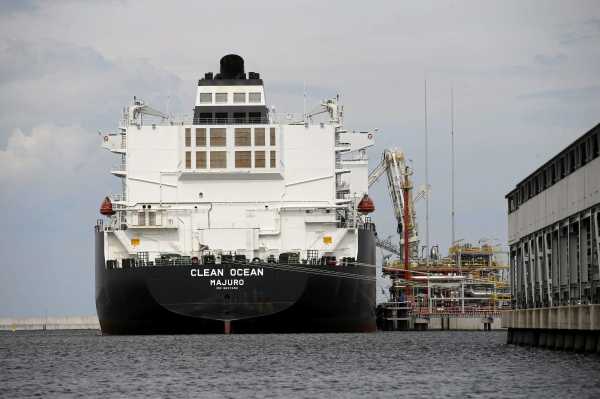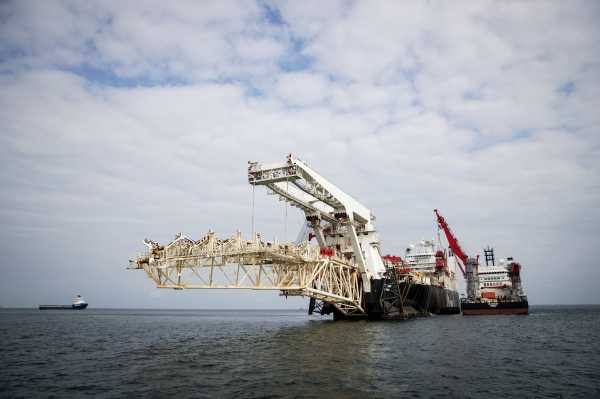
This week, Turkey’s president revealed that he and the German chancellor had confronted President Trump over the right to independently decide where they buy their energy supplies. On Tuesday, Trump again expressed his disdain for Berlin’s “dependence” on Russian gas. Meanwhile, German officials fear US sanctions on Nord Stream 2 may be imminent.
Speaking at the UN General Assembly in New York City on Tuesday, Donald Trump warned that Germany would “become totally dependent on Russian energy if it does not immediately change course.” The US president followed up the warning with a sales pitch, saying Washington “stands ready to export our abundant, affordable supply of oil, clean coal, and natural gas” to its partners.
Later in the week, Turkish President Recep Tayyip Erdogan dropped a bombshell about closed door talks he and German Chancellor Angela Merkel had had with Trump at the July NATO summit in Brussels. There, Erdogan said, Trump accused the US’s NATO allies of “feeding Russia,” chiding Berlin especially for giving Russia too much income from gas exports. The Turkish president shot back at Trump, telling him that if Ankara’s supply of Russian gas, which account for 50 percent of its total consumption, were to stop, the Turkish people would freeze during the winter. Merkel, Erdogan said, replied in a similar vein, telling Trump that Russia sells Germany with 38 percent its gas needs, and that she would not let the German people freeze, either.
Amid preparations by Gazprom and a consortium of Western European energy concerns to start full-scale construction of the Nord Stream 2 pipeline, some European officials have expressed fears that the US may turn to sanctions to try to stop the 55 billion cubic meter capacity pipeline from moving forward. On Friday, Peter Beyer, the German government’s coordinator for trans-Atlantic relations, told Bloomberg that the US may slap sanctions on European energy companies either before the November midterms or shortly after, in early 2019.
German Industry Has ‘Big Problem’ With US Meddling
German media mounted a defense of the Nord Stream 2 project in the wake of the US president’s latest remarks, stressing the project’s importance for the country’s industry. German industrial association president Dieter Kempf told Suddeutsche Zeitung he had a “big problem when a third state interferes in our energy supply.”
Furthermore, the newspaper complained, it’s becoming clear under President Trump that any geostrategic reservations the United States may have had about German-Russian energy cooperation have gone out the window in favor of a “commercial dimension,” with the Americans opposing the project simply out of a desire to sell their own gas to Germany. Unfortunately for US suppliers, the daily noted, high transport costs make US LPG gas “simply uneconomical,” with US, Qatari and Indonesian LPG priced some 30 percent above conventional pipeline gas in Europe.

The LNG tanker “Clean Ocean” is pictured during the first US delivery of liquefied natural gas to LNG terminal in Swinoujscie, Poland June 8, 2017.
US Trying to ‘Lord Over’ Its European Allies
Commenting on President Erdogan’s remarks from the July NATO summit, Igor Anansky, deputy chairman of the Russian Duma’s committee on energy, stressed that Ankara and Berlin’s resistance was entirely rational. “The leaders of Germany and Turkey are defending their states and their citizens, as they should. It’s advantageous for them to purchase the gas supplies which are cheaper,” the lawmaker noted. Unfortunately, he emphasized, it seems that “the US is no longer just an ‘older brother’ for Europe, but is trying to become its master, and doesn’t care about the opinion of its junior partners.”
In any case, construction of the pipeline has already begun, Anansky noted. Accordingly, “even without other partners, Gazprom will build the pipeline, and Germany, and other countries, will receive cheaper gas,” the lawmaker said.
Washington’s Price Trap
For his part, Vladimir Olenchenko, a senior fellow at the Center for European Studies at the Moscow-based Institute of World Economy and International Relations, told Sputnik that Germany, unlike Poland or the Baltic states, has an acute recognition of the need to separate economics and politics in relations with Russia, for its own sake.
“As far as the determination shown by the German side in matters of Russian gas, the fact is that Russian gas serves as a key raw material for Germany’s export-oriented industry. The price of German goods is formed based on the costs of raw materials – the cheaper these are, the cheaper and more competitive the product is,” Olenchenko explained.
Berlin understands that if it switches from Russian gas to US LNG supplies, its industrial exports will become more expensive and less competitive. “Who are the competitors to German goods? In most cases, it’s the US. Therefore, the Germans are firmly defending their position, because they clearly understand that the competitiveness of their industry is based in part on the price of Russian gas,” the analyst stressed.
Pressure Won’t Stop Until Nord Stream 2 Launched
In a press conference with Polish President Andrzej Duda last week, President Trump said that at the moment, the US has no plans to sanction European companies working with Gazprom on Nord Stream 2. Speaking to Sputnik, Dmitry Marinchenko, director of the natural resources and commodities group at Fitch Ratings, said that although this is a positive signal, the US will not end its opposition to the project.
In fact, Marinchenko suggested, US pressure will continue. “The sanctions rhetoric is likely to accompany Nord Stream 2 right through to its launch. Sanctions could still appear in some form, but they are unlikely to prevent the implementation of the project, especially given that construction of its underwater section has already begun,” the financial analyst concluded.

Nord Stream 2 pipeline construction underway in Finnish waters in the Baltic Sea.
Sourse: sputniknews.com






